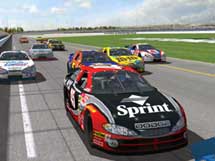|
This game for rent
|
 |
February 6, 2002: 1:20 p.m. ET
Product placement is a worrisome trend in the gaming industry
|
NEW YORK (CNNmoney) - I've got a bone to pick with Skittles.
Or maybe it's with Simon & Schuster Interactive. Heck, maybe it's with the entire gaming industry.
"Darkened Skye," a 3-D action fantasy game, has just arrived on retail shelves. It's got a lot of what you expect in these games: an ancient world controlled by a merciless overlord, a buxom heroine and spells (with which you smite your enemies). It's also got the most blatant product placement since Chap Stick in those commercials for "The Mothman Prophecies." In order for your character to gain mana (mystical energy used to cast spells), you'll have to collect the fruit flavored candies as you traverse the land. In fact, the entire game is set in the various worlds you see in the Skittles commercials.
Product placement is actually turning into a growth industry in the gaming world. Some examples are in-your-face, like "M&M's: The Lost Formulas," a children's title that featured the familiar red and yellow candies from the ad campaign combining action and mathematics to save "the future of chocolate candy". Other games take a more passive approach. Sierra's "NASCAR Racing Season 2002" is realistic to the point of having corporate sponsorships on the cars.
| |

|
|
Play the rainbow: "Darkened Skye" is set in the land of Skittles commercials | |
Now, granted, there are some very good reasons developers allow corporate placements in their games. The cost of bringing a title from concept to reality continues to escalate, usually coming in at no less than $1 million. Using Skittles as power-ups or slapping the Hoyle name on a series of card games can reduce overhead, letting both publisher and developer pocket more of the profits.
"I think there's going to be a lot of ways of offsetting the costs [of developing a game]," said Jeff Siegel, vice president and creative director of SSI. "Hopefully, most of those ways do not interfere with the gameplay."
Here's the good news about these product placements: They're not negatively affecting the quality of the games. "Darkened Skye" is getting positive reviews, with special mention of the game's abundant use of humor (sometimes even at the expense of Skittles). And Sierra's NASCAR series is one of the most praised line of games in the simulation genre.
"There's a quid pro quo," said Siegel. "I think if you give the people a good entertainment experience, they might overlook the things you had to do to produce it."
And there are times when the placement and the product are a natural fit. NASCAR, for instance, probably wouldn't seem as authentic without ads everywhere. Sierra says that's part of the reason you'll see them when you play (though they won't comment on how much, if any, the sponsors pay for the exposure).
"We have the actual ads seen on the tracks included in our game," said Annie Eckles, associate PR manager for Sierra. "Corporate sponsors, their teams, and drivers are all part of the approval process when it comes to developing our NASCAR games. In addition, we seek everyone's permission to use their marks. ... In terms of [financials], we're not at liberty to say."

|
|
|
This space for rent: One of the cars from "NASCAR Racing Season 2002" | |
Maybe it's the purist in me. The way I see it, ads and product placements in games are akin to having to watch commercials in a movie theater. You've paid a price for admission (in this case, the $20-$50 for the game), which should exempt you from having to be exposed to advertising.
Knowing that corporations can buy their way into a title detracts from the escapist environment gamers crave. You have to ask how far this might go: A Starbucks in "The Sims"? Motrin IB in "Virtua Fighter"? A Remington pump-action shotgun in the next "Doom"?
Ok, that last one's probably going a little too far. With the heat first person shooters have taken from Congress, no companies want to be associated with the genre. That's ironic, really, since those games have an incredibly loyal fan base that spends a lot of money on each new release. Granted, promoting a firearm in a shooter might be far outside the bounds of good taste, but if companies want to reach the core gamer, typically someone in their mid- to late-20s with a lot of cash to burn, there's no more direct route.
Anyone care to wager on how long it takes for them to figure that out?
Morris is director of content development for CNN/Money
Click here to send an email to Chris Morris 
|
|
|
|
|
|

|

